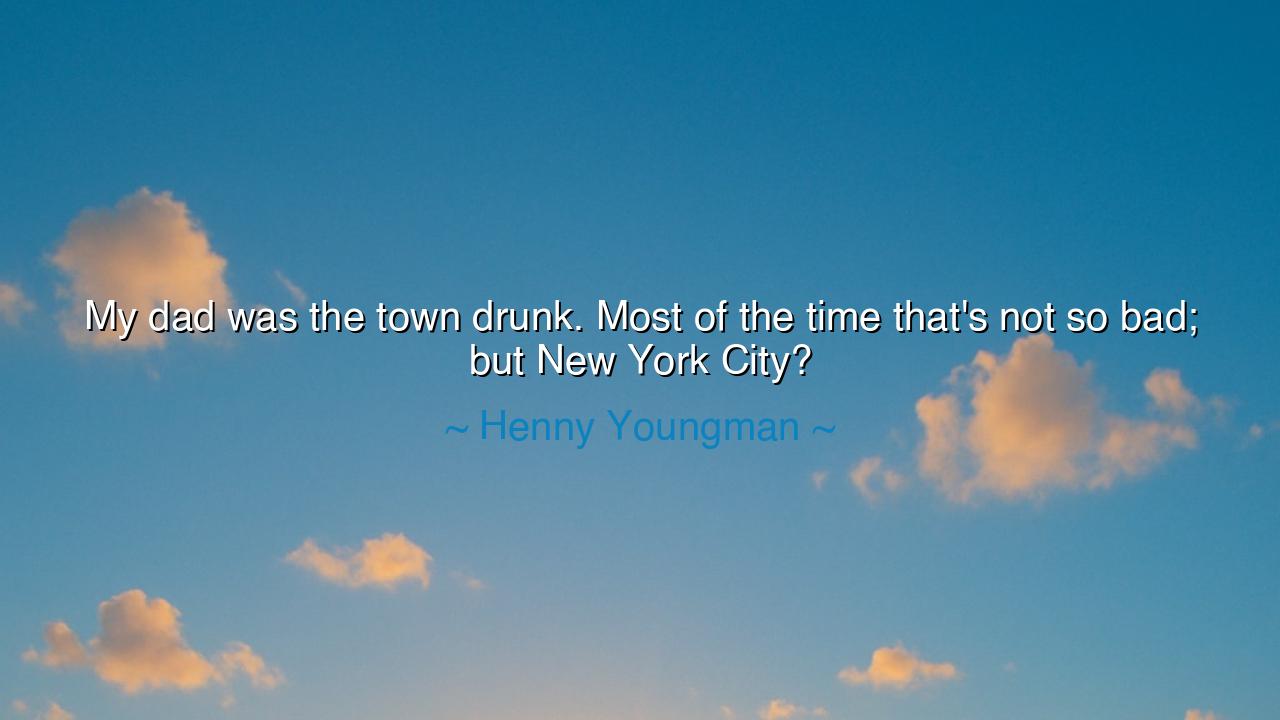
My dad was the town drunk. Most of the time that's not so bad;






"My dad was the town drunk. Most of the time that's not so bad; but New York City?" Thus spoke Henny Youngman, the famed comedian whose wit sparkled with both humor and humanity. Beneath the laughter of this jest lies a deeper truth — that even in humor, there is the reflection of life’s weight, and that the soul, through laughter, seeks not to deny pain, but to master it. His words, though light in tone, speak of acceptance, resilience, and the transforming power of perspective. For humor, in its highest form, is the art of turning sorrow into wisdom, and struggle into song.
Youngman’s line, on its surface, is a quip — a play upon scale. To be the “town drunk” is one thing in a small village, where one man’s folly becomes local lore. But to bear that title in the vastness of New York City, the city of millions, is a tragedy writ large, a comedy steeped in exaggeration. Yet beneath the laughter, one feels the ache of memory — the father, flawed and human, whose weakness became both burden and lesson. The son, instead of drowning in shame, learned to transmute that pain into art. Through humor, he claimed mastery over what might have once humiliated him.
For such is the way of the wise — they do not allow their suffering to chain them; they reshape it into light. The ancients, too, understood this truth. The Greeks had their satirists, who mocked kings and gods alike, turning tragedy into laughter to reveal the follies of man. Even in the sacred plays of Aristophanes, beneath the laughter lay the pulse of sorrow — a reminder that to laugh at one’s pain is the first step toward freedom from it. Henny Youngman, like those bards of old, wielded humor as a philosopher’s blade, cutting through despair to reveal understanding.
It is said that Henny grew up amidst hardship, the son of Jewish immigrants who fled poverty and persecution in search of a better life. His family’s struggles were not unique; they were the story of millions who arrived in New York, carrying hope in one hand and sorrow in the other. The image of a “town drunk” becomes, in this light, a symbol of the flawed but enduring human spirit — one that stumbles, fails, and yet remains loved. And through his humor, Youngman transformed what could have been a mark of shame into a testament to compassion — for he learned to laugh not at his father, but through him.
There is a lesson here that transcends time: that laughter is not denial, but redemption. To laugh is to reclaim power over one’s past, to say, “This too is part of me, but it does not define me.” The man who can turn his wounds into wit, his hardships into stories, becomes a healer of others as well as himself. In this way, humor becomes a kind of moral courage — the strength to face the absurdities and sorrows of life with open eyes and a steady heart.
The Romans, too, admired such courage. They spoke of gravitas — the seriousness of life — but they also honored levitas, the lightness of the soul that tempers despair. A man who can balance both is complete. So it was with Youngman: his laughter was not the mockery of the bitter, but the forgiveness of the wise. Through his humor, he taught that no past, however dark or humiliating, is without worth, if it leads to understanding and empathy.
So, my child, learn this from the words of Henny Youngman: do not flee from the imperfections of your story, nor from the faults of those who raised you. Every life is woven with shadow and light, folly and grace. Whether your pain is born of family, circumstance, or your own mistakes, remember that it can be transformed. The laughter that springs from truth is not shallow — it is holy. It is the sound of the human spirit rising again.
When you find yourself burdened by the past, take this to heart: laugh, but with compassion. Let your humor lift you, not harden you. For in learning to smile at what once wounded you, you do not erase it — you redeem it. Thus you will live as Youngman did, turning the sorrows of the world into moments of light, proving that even from pain, joy can be born. For the truest laughter, like the truest wisdom, is not found in denial of life’s darkness — but in the courage to face it with grace.






AAdministratorAdministrator
Welcome, honored guests. Please leave a comment, we will respond soon